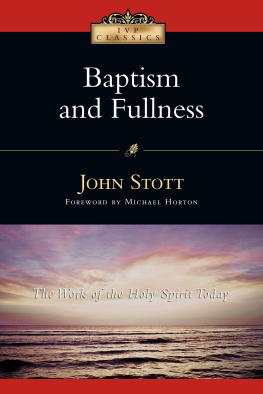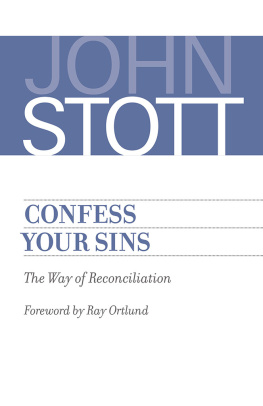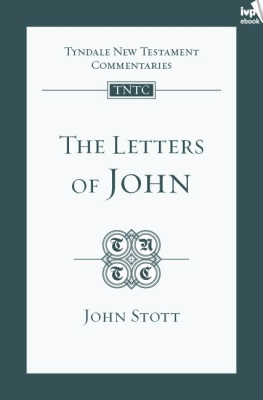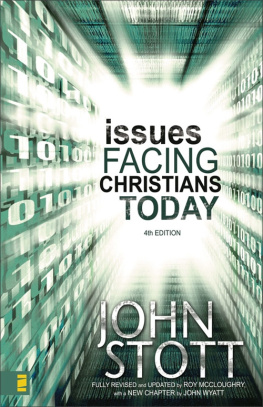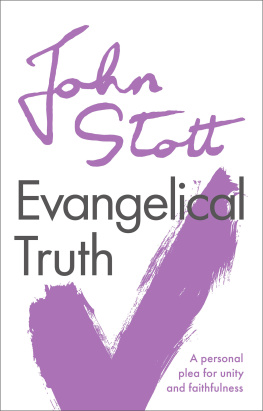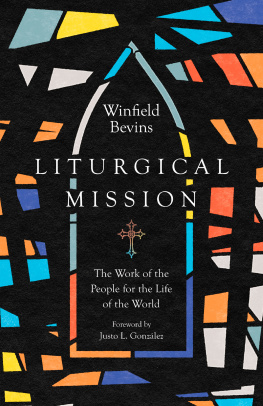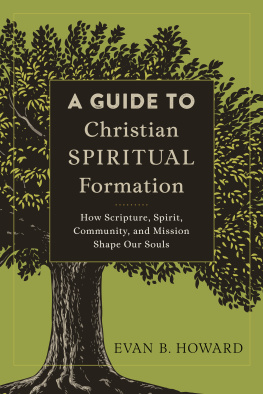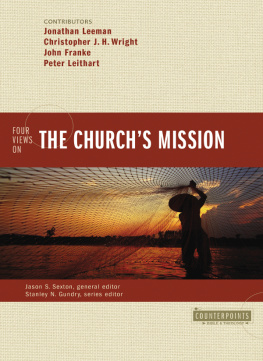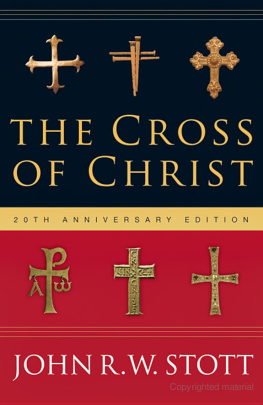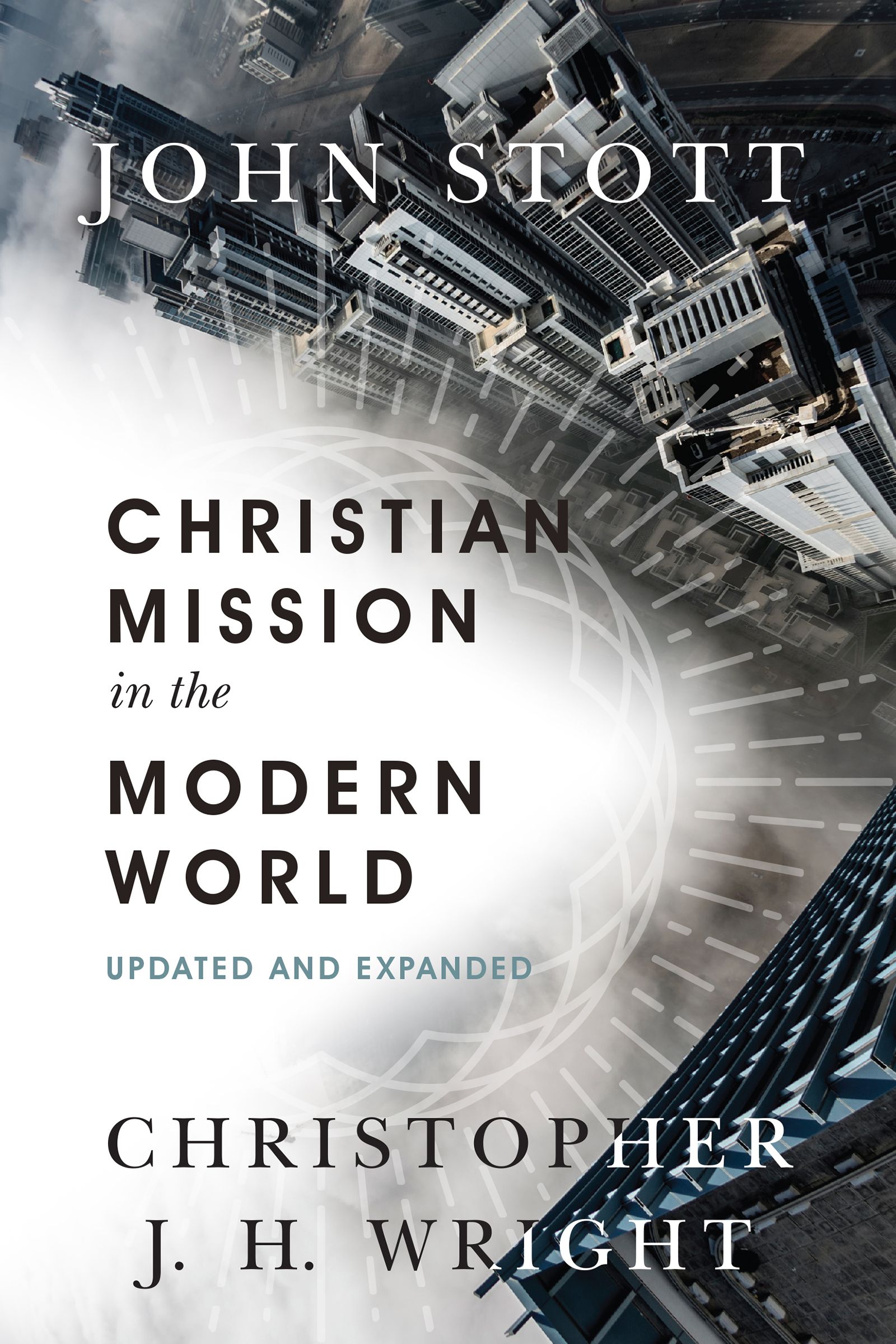All John Stotts and Chris Wrights royalties from this book have been irrevocably assigned to Langham Literature (formerly the Evangelical Literature Trust). Langham Literature is a program of the Langham Partnership International (LPI), founded by John Stott. Chris Wright is the International Ministries Director.
Langham Literature distributes evangelical books to pastors, theological students and seminary libraries in the Majority World, and fosters the writing and publishing of Christian literature in many regional languages. For further information on Langham Literature and LPI, visit langham.org .
PREFACE TO THE FIRST EDITION
A part from my personal commitment to evangelism, both to evangelism through the local church andsince a mission in Cambridge University in 1952to university evangelism, there are four particular experiences that have contributed to the writing of this book.
First, in 1968 I attended as an adviser the Fourth Assembly of the World Council of Churches at Uppsala. Finding myself allocated to section 2 (Renewal in Mission), I was immediately plunged into the thick of contemporary debate about the meaning of mission.
Then, although I was not able to attend the Salvation Today conference at Bangkok in January 1973, I naturally followed it with deep interest and concern. When invited the following year to deliver the annual Baker lecture in Melbourne (in memory of Bishop Donald Baker, New Testament scholar and former principal of Ridley College, Melbourne), I chose as my theme Salvation Yesterday and Today. The substance of this lecture is reproduced with permission, and enlarged, in chapter four.
Third, the planning committee of the International Congress on World Evangelization at Lausanne in July 1974 asked me to give an opening address on the nature of biblical evangelism, and to seek to provide a biblical definition of the five words mission, evangelism, dialogue, salvation and conversion.
So when, fourth, Canon Jim Hickinbotham, principal of Wycliffe Hall, Oxford, invited me to deliver the 1975 Chavasse Lectures (in memory both of Bishop F. J. Chavasse of Liverpool, who had been principal of Wycliffe Hall, and of his son Bishop Christopher Chavasse, who had been master of St. Peters College and chairman of the governing body of Wycliffe Hall), it seemed appropriate to take the same five words and elaborate what I had attempted to sketch at Lausanne. I am very grateful to the principal, staff and students of Wycliffe Hall for the kindly welcome and attentive hearing that they gave me, and for the stimulus of the question time that followed each lecture.
Although I have no wish to disguise myself or to conceal that I am a Christian of evangelical conviction, this book is not an exercise in party propaganda. I have no axe to grind, except to go on seeking to discover what the Spirit is saying through the Word to the churches. Nothing encouraged me more at Wycliffe than to hear the principals concluding comment that he thought I had been scrupulously fair toward those with whom I have ventured to disagree. This has certainly been my aim. Besides, if I am critical of others, I desire also to be critical of myself and of my fellow evangelicals. Life is a pilgrimage of learning, a voyage of discovery, in which our mistaken views are corrected, our distorted notions adjusted, our shallow opinions deepened and some of our vast ignorances diminished.
Perhaps the greatest need in current ecumenical debate is to find an agreed biblical hermeneutic, for without this a broader consensus on the meaning and obligation of mission is unlikely ever to be reached.
John Stott
April 1975
PREFACE TO THE REVISED AND EXPANDED EDITION
I well remember buying Christian Mission in the Modern World in 1975, as a theological student in the midst of my doctoral studies on the Old Testament and ordination training at Ridley Hall, Cambridge. It came in the wake of the excitement generated by the reports of the first Lausanne Congress on World Evangelization in 1974 and its epoch-making Lausanne Covenant. Many of us as younger British evangelicals were taking courage from the resurgence of evangelical theology, in the face of the liberalism still dominating university theology departments. At the same time we were animated by the recovery of the historic evangelical social conscience, committed to an understanding of mission that included engagement with the social, economic, political and cultural realities of our day. And John Stott was our hero and mentor in both those realms. Had he not stood up to robustly defend a biblical, evangelical understanding of mission and evangelism in World Council of Churches gatherings? Was he not already urging us to be salt and light in society, to penetrate our culture rather than withdraw from it? This book, in its five pithy chapters, seemed to capture those concerns and fuel our zeal.
I had read many of the books he wrote in the 1960s, had relished the Bible readings he gave as a visiting speaker at the Cambridge Inter-Collegiate Christian Union and the lectures with which he enriched gatherings of the Theological Students Fellowship, and had heard him preach at All Souls Church, Langham Place. But I did not meet John Stott personally until 1978, at the National Evangelical Conference on Social Ethics, which he chaired and at which I had been invited (as a fresh young Anglican curate with a doctorate in Old Testament ethics) to give one of the morning Bible expositions. Our initial contact there led to ongoing friendship, culminating in our years of working together after he invited me to take on the leadership of the ministries he had founded within the Langham Partnership in 2001years that included the pleasure of sometimes sharing with him his writing-retreat cottage in Wales, The Hookses, where I now sit to write this preface.
So it was with a great sense of personal debt as well as enormous privilege and not a little unworthiness that I accepted the invitation of the John Stott Literary Executors and InterVarsity Press to work on a revised edition of Christian Mission in the Modern World, to be released in the fortieth year since its original publication, with a request to relieve the book of some of its more dated material and to add some reflections of my own on each of the chapters. Just a word about each of those aspects of the task.
In revising John Stotts own chapters, I scrupulously avoided modifying his meaning at any point. I have removed references to debates of the 1960s and early 1970s that are long since lost in time and significance, along with some (but not all) of the names and writings of the sparring partners with whom Stott engaged, and the detailed history of some particular controversies. Even with that trimming, it is important for the reader to be aware that whenever Stott uses words such as recent, current or contemporaryhe was writing in the context of the 1960s and 1970s. Knowing that Stott himself approved of the more gender-inclusive language that became more common in the 1990s and onward, I revised the predominant use of man and men that was still understood and accepted generically in the 1970s.
In preparing my own reflections, I was aware, first of all, that this book was created out of a series of five lectures that he had given in various venues, and in any lecture it is impossible to say all there is to say on any given topic. Readers need to be aware, therefore, that if they want a full understanding of the mind of John Stott on, say, salvation, they need to graduate quickly from reading chapter four of this book to exploring the breadth and depth of


